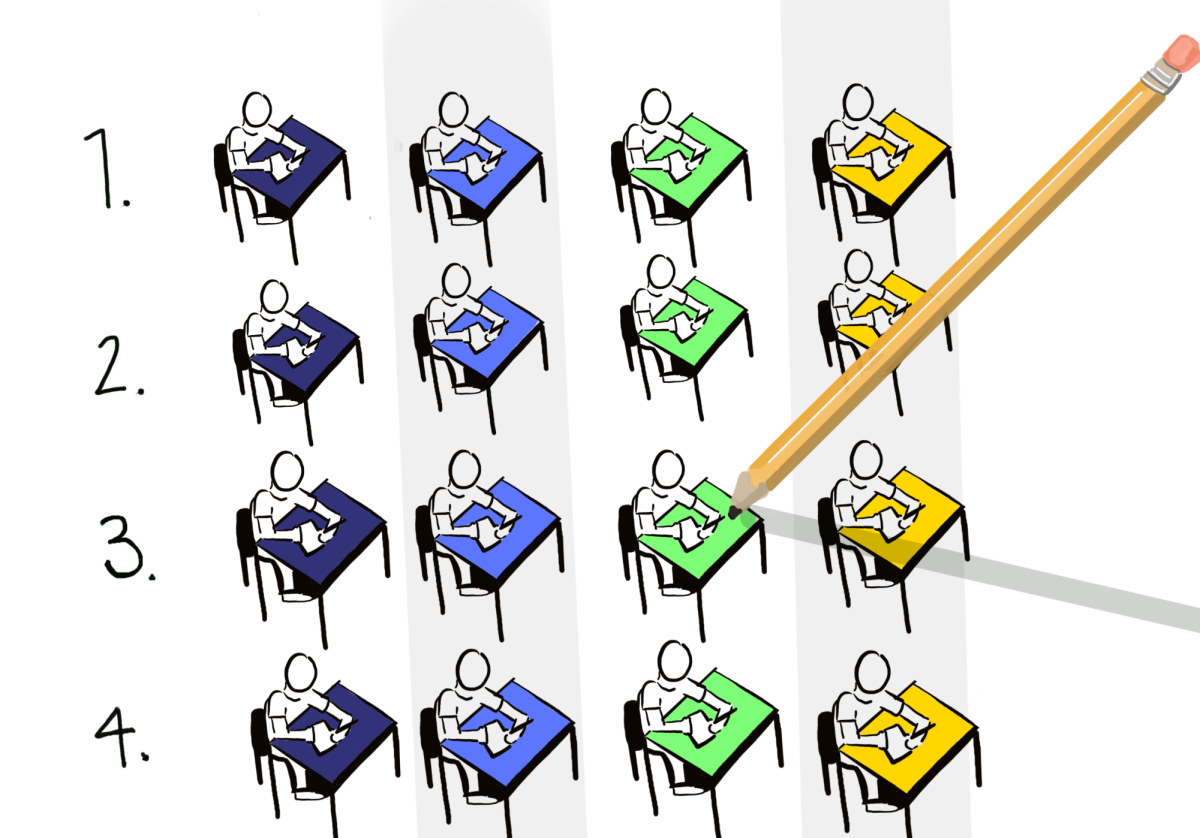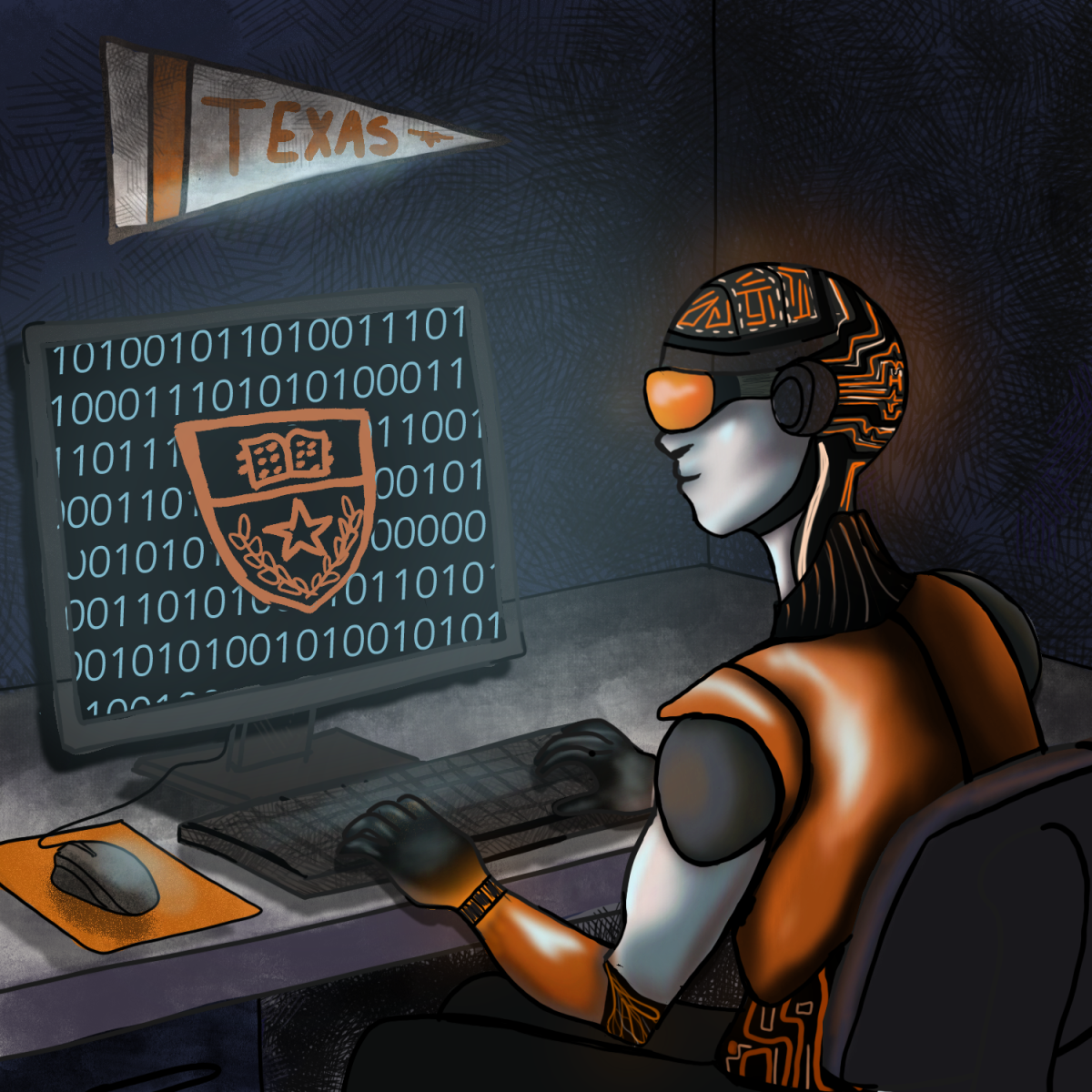Editor’s Note: This column is the third in a series by associate classics professor Jennifer Ebbeler on the changing nature of higher education at UT-Austin and other institutions. Look for Prof. Ebbeler’s column in the Opinion section of this paper every other Wednesday.
On a recent Thursday morning, students in the 9:30 am section of professors David Vanden Bout and Cynthia LaBrake’s Chemistry 301 were learning about covalent bonding. Before class, they had been assigned an online learning module that introduced them to ionic and covalent bonding and nomenclature. Class started with a short i>clicker quiz based on the learning module, during which each question was followed by a short explanation of the correct answer. Vanden Bout then introduced the concept of covalent bonding with a short lecture before he turned the class loose to apply these newly-learned concepts.
Around me, students were drawing the bonding structures of molecules, starting with relatively easy ones like H2 and progressing to the more complex molecules, such as C2H6 and COCl2. The students worked on these problems with one another in small, self-determined groups.
For a class of just over 300 students, there were eight peer mentors and two graduate teaching assistants wandering around the auditorium and stopping to offer help to students who needed it. These peer mentors did not provide answers. Rather, they walked the students through problem-solving strategies until the students themselves were able to solve the problem.
Peer mentors play an indispensable role in Vanden Bout and LaBrake’s Chemistry 301. There are approximately 50 of them, assigned to six different sections. The only requirement to be a peer mentor is a grade of B in the class and, says Dr. Vanden Bout, “an interest in helping.”
Mentors start off by taking a for-credit course, in which part of their grade is connected to their work as a mentor. More experienced mentors are paid a stipend for their work, and also do some grading.
Perhaps the most impressive part in all of this was how well it worked in the classroom. The presence of the mentors allowed for a large-enrollment course to look very much like a small, active seminar. From the first day of class, the message to students is that there is someone nearby who can help with any questions. This message is reinforced outside the classroom thanks to the use of Piazza, a discussion board that allows students to post and answer questions.
This transformation from predominantly lecture-based instruction to a more student-centered pedagogy is a product of the first round of the University’s Course Transformation Program. As a “gateway” course — that is, a course that many students need to pass before moving on to higher-level courses — Chemistry 301 was ripe for redesign. Now in the third year of the redesign project, Chemistry 301 is a model introductory course (and not just for the natural sciences). LaBrake and Vanden Bout created their own online resources, with their own videos, that have supplanted a required textbook.
Given the ongoing debate about licensing content created by other faculty, I asked LaBrake and Vanden Bout whether they thought it was important that their content was their own (or that of colleagues in the UT chemistry department). Both strongly emphasized that using content they had created themselves was essential.
“[Creating content ourselves] shows that we care,” LaBrake said.
Chemistry 301, as taught by LaBrake, Vanden Bout and their team, could be characterized as a flipped class, in which the “lecturing” portion of the course occurs outside the classroom through web modules and the problem-solving, traditionally assigned as homework, occurs inside the classroom.
Yet, as LaBrake warns, “flipped is a dangerous term.” Indeed, they haven’t flipped their class so much as they have developed ways to support student learning in a course that requires both conceptual understanding and an ability to apply that conceptual understanding to problems. Lecture is still very much a part of their class. But now it’s done in short bursts and only to reinforce important concepts.
The instructors make excellent use of low-stakes formative assessments, which allow students to see how well they understand a concept before they take a high-stakes midterm exam. I was struck by how many opportunities students had to get feedback on their learning: assigned learning modules, i>clicker quizzes, in class problem-solving activities, Piazza, homework problems, office hours. By the time a student sits down to take a midterm exam, that student has encountered the problems in multiple contexts and with a range of support.
LaBrake and Vanden Bout have designed a class that supports student learning at every step, and it shows: More students are passing the course than ever before. Both LaBrake and Vanden Bout are outstanding professors, but the course would not be nearly so effective if it weren’t supported by the outstanding resources the professors have created for students, in the form of an e-textbook, activity packet and peer mentoring program. Their current challenge — a familiar one for instructors who have moved away from the traditional lecture model of teaching — is to find ways to sustain the tremendous amount of time and human labor that such an excellent course requires.
Ebbeler is an associate professor in the department of classics from Claremont, Calif, and she is interested in receiving student feedback on topics discussed in her columns. You may reach Ebbeler at [email protected] and follow her on Twitter @jenebbeler.




















